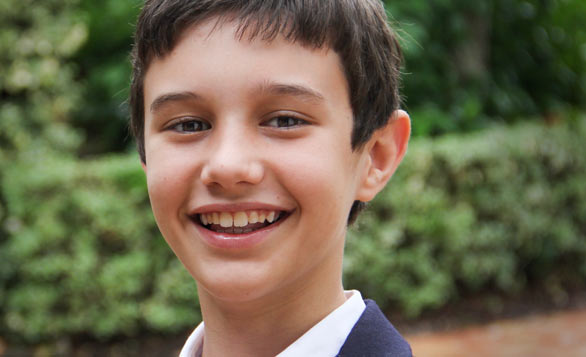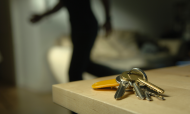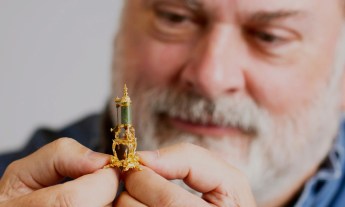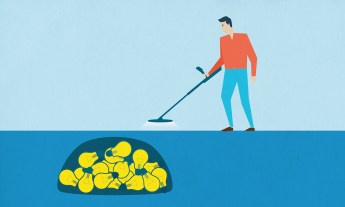
When 12-year-old Peyton Robertson sees a problem, he is going to fix it. So when the young scientist noticed a perennial problem in his hometown of Fort Lauderdale, Florida –flooding during the region’s nasty hurricane season – he set to work building a better sandbag.
Peyton’s sandbag contains an expandable polymer that’s lightweight and easy to transport when dry, but that becomes a dense solution to hold bags firmly in place when it’s wet. He also added a dash of salt – an addition that makes the solution in the bags heavier than approaching seawater. And to eliminate the gaps between sandbags that tend to let some water through, he designed an interlocking fastener system that holds the bags in place as the polymer expands. As the bags dry after the storm, they return to their original state so they can be reused.
The ingenious sandbag (and Peyton’s “commanding delivery, innovative thinking, and sound grasp of the scientific method”) won him first place in the prestigious Discovery Education 3M Young Scientist Challenge. He was the youngest winner in the contest’s history. In addition to the $25,000 award and a trip to Costa Rica this summer with the other finalists, he got lots of love from the media, including an adorable spot on The Ellen DeGeneres Show. He’s also filed for an open patent so that others can use and build upon his design.
In fact, he currently has three pending patents. The first, a case to maintain a golf ball’s resting temperature, came to him because he wondered why his golf balls didn’t bounce as far in cold weather. (He was eight at the time.) The second, retractable training wheels, were his creative way to help his sisters learn to ride their bikes. Now bike manufacturers are calling to buy the idea. When Peyton talks about science, his insatiable curiosity about the world around him is evident. He’s not into science for science’s sake – he wants to understand his world and make it better. “I see the world as a really dynamic place that I can change and affect,” he said in his appearance on The Ellen DeGeneres Show. “And I love to use the math and science I’ve learned to help people.”
With so much wild weather afoot, we wanted to hear more from this promising problem solver. We talked with Peyton over email about where to seek inspiration and what’s up next. Our first question:
How did you become interested in science? Here’s Peyton —
I actually didn’t so much become interested in science as a stand-alone subject as I became interested in the science behind other things I was working on and was curious about. For example, if you love baseball, consider what makes a curve ball curve. If you love movies, consider how special effects work. If you are interested in cooking, think about light waves in a microwave.
So what made you decide to take on the sandbag?
The idea to redesign the sandless sandbag came out of my experience living through hurricanes in South Florida. And the idea of expandable polymer has been around for a long time. It’s been used as fake snow and even in other sandless bags. It takes on water and expands when wet. But the key to my design is the addition of salt to the polymer.
You make it sound so easy. Did you experience any frustrations along the way?
Well, when you add salt to expandable polymer, the polymer swells less. So one of the biggest challenges was to understand, test and calculate the swell rate of the polymer when exposed to 10 percent salt so I could pre-fill the bags with the correct amount of polymer and salt.
What’s the next big project you plan to take on?
In Florida, citrus canker causes trees to drop their fruit early. I’ve been wondering whether it might be possible to reduce citrus canker with something similar to a preventative immunization for trees. I’ve also been thinking about whether it might be possible to combine underwater speaker technology, echolocation and an algorithm to help lead whales like those recently trapped here in the Everglades back to open waters.
It’s great that you have such a strong sense of the local issues in your community. Do you have any advice for other kids who want to get involved in problems affecting their areas?
Start by listing all the problems that affect the area in which you live. Odds are those problems will be more interesting to you, provide more local resources to access, and ultimately prove to be issues with a broad global impact.
What’s one thing you know that you wish everyone knew?
Failure is progress and a normal part of the process. Whether it’s science or life, you have to start, fail and just keep pushing. In a football game, time runs out, and a golf match ends after the last hole. But when you are working on something and it doesn’t work, you just extend the game – and give your experiment or your prototype another go.















